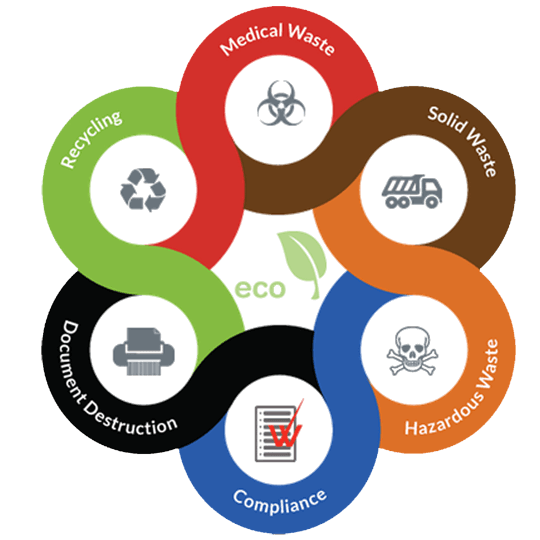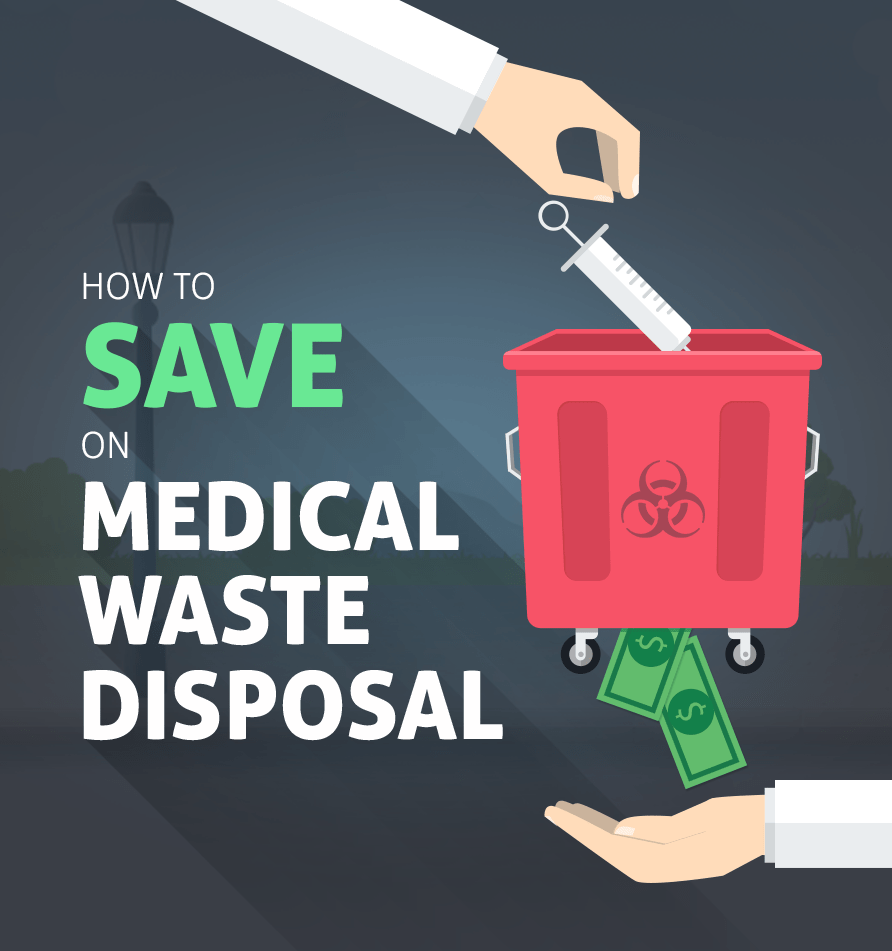Specialist Medical Waste Disposal Service: Guarding Your Center and Community
Wiki Article
Making Certain Safe Handling and Disposal of Medical Waste
Making certain secure handling and disposal of medical waste is of critical value in healthcare settings. Incorrect monitoring of medical waste can present significant dangers to the environment, public wellness, and healthcare employees. This requires adherence to rigorous guidelines and procedures for its risk-free handling and disposal. In this intro, we will certainly check out the significance of proper medical waste administration, the risks connected with incorrect handling and disposal, along with the guidelines and approaches that can be implemented to guarantee its secure disposal. Furthermore, we will discuss the value of training and education and learning for healthcare experts in order to preserve a tidy and secure healthcare atmosphere. By complying with these methods, we can effectively minimize the potential dangers connected with clinical waste.Relevance of Proper Medical Waste Management
Proper medical waste monitoring is of utmost value in ensuring the security and well-being of healthcare experts, people, and the basic public. Clinical waste describes any type of waste created by medical care facilities during the medical diagnosis, treatment, or immunization of people or pets. This waste can position major wellness dangers otherwise managed and gotten rid of appropriately.
Among the main reasons that correct medical waste administration is essential is to avoid the spread of contagious diseases. Medical waste, such as used needles, contaminated dressings, and organic materials, can lug hazardous microorganisms. Otherwise taken care of and gotten rid of properly, these virus can be transferred to health care workers, individuals, waste trainers, and also the public, causing the possible outbreak of diseases.
In addition, appropriate clinical waste monitoring helps safeguard the atmosphere - medical waste disposal service. Medical waste consists of hazardous products, consisting of chemicals, drugs, and contaminated compounds. When not handled suitably, these substances can pollute soil, water bodies, and the air, presenting a considerable danger to ecological communities and public health and wellness
In addition, reliable medical waste administration makes sure conformity with neighborhood laws and worldwide criteria. Federal governments and regulatory bodies have established guidelines and protocols to guarantee the risk-free handling, storage, transport, and disposal of clinical waste. Following these policies is important to prevent lawful consequences and maintain the online reputation and reputation of medical care facilities.
Risks of Improper Handling and Disposal

If clinical waste is not effectively disposed of,Clients can additionally be subjected to these contagious conditions. For circumstances, if contaminated needles or various other sharps are not taken care of in designated puncture-proof containers, they may unintentionally prick patients, resulting in possible infections. In addition, if clinical waste is not set apart properly, there is a risk of cross-contamination between various sorts of waste, more increasing the possibilities of disease transmission.
Inappropriate disposal of clinical waste can additionally have damaging effects on the atmosphere and the general public. If medical waste is not dealt with and dealt with appropriately, it can contaminate water resources, soil, and air, bring about the spread of diseases and contaminants. This can have long-lasting repercussions on environments and public health and wellness.
Guidelines for Safe Handling of Medical Waste
Executing efficient protocols for the risk-free handling of medical waste is vital in guaranteeing the security of health care professionals, people, and the public. These standards are vital in minimizing the dangers connected with the handling and disposal of clinical waste, such as infections, injuries, and ecological pollution.Most importantly, medical care centers have to develop an extensive waste monitoring strategy that adheres to regional, national, and global policies. This plan needs to include clear directions on waste segregation, packaging, transportation, storage space, and labeling. It is crucial to separate different types of waste, such as sharps, transmittable materials, pharmaceuticals, and non-hazardous waste, to stop cross-contamination and advertise safe disposal.
Furthermore, healthcare personnel should receive thorough training on proper waste handling methods. They must be educated on the prospective dangers of clinical waste, the suitable use personal protective equipment (PPE), and the right treatments for handling, transferring, and taking care of various sorts of waste.
Additionally, healthcare facilities should frequently keep track of and investigate their waste administration practices to ensure compliance with standards. This includes performing routine evaluations, reviewing waste handling treatments, and offering feedback and training to team participants.
Effective Approaches for Waste Disposal
To make sure the secure handling and disposal of clinical waste, it is necessary to employ reliable methods for garbage disposal. Medical waste can position considerable threats to public health and wellness and the setting if not dealt with and dealt with correctly. Health care centers and waste management organizations must implement ideal methods to minimize these threats.One effective technique for waste disposal is segregation. It includes dividing different sorts of medical waste based on their features. Partition allows for the correct therapy and disposal of each waste classification, reducing the possibility for contamination or injury. Medical care facilities must provide clear guidelines and training to personnel members on how to segregate waste properly.

Furthermore, health care centers ought to team up with accredited waste monitoring companies to make certain appropriate disposal of clinical waste. These companies have the know-how and tools called for to securely get rid of and take care of of clinical waste in compliance with laws and best practices.
Training and Education And Learning for Health Care Professionals
Health care experts play a critical duty in ensuring the risk-free handling and disposal of medical waste through extensive training and education. It is necessary for healthcare carriers to have a deep understanding of the potential threats connected with clinical waste and the appropriate procedures for its management. By receiving appropriate training, medical care experts can decrease the potential transmission of transmittable conditions, prevent environmental contamination, and secure both themselves and the public.
Furthermore, training programs should highlight making use of personal safety equipment (PPE) and proper hand health techniques when handling medical waste. medical waste disposal service. Health care specialists need to know exactly how to properly make use of and get rid of of PPE to safeguard themselves from possible direct exposure to harmful products. They ought to also be informed on the relevance of normal handwashing and the appropriate usage of hand sanitizers to lessen the spread of contagious illness
Continuing education and learning and normal updates on clinical waste administration techniques are crucial for medical care experts. As policies and guidelines progress, it is necessary to keep doctor educated about any type of modifications in methods and best methods. visit This will certainly ensure that they stay up-to-date and preserve a high standard of safety and security in getting rid of and managing of clinical waste.
Final Thought
In final thought, appropriate handling and disposal of medical waste is critical to guarantee the safety of medical care experts, patients, and the environment. By sticking to these practices, we can mitigate the prospective dangers associated with medical waste.Medical waste refers to any type of waste generated by healthcare facilities during the diagnosis, therapy, or booster shot of pets or human beings. If clinical waste is not set apart effectively, there is a danger of cross-contamination in between different types of waste, more boosting the opportunities of illness transmission.
It is important to separate various kinds of waste, such as sharps, transmittable products, pharmaceuticals, and non-hazardous waste, to avoid cross-contamination and promote risk-free disposal. WasteX Medical Waste Disposal.
To make sure the secure handling and disposal of medical waste, it is vital to employ effective techniques for waste disposal. Furthermore, medical care centers need to develop a regular waste collection and transportation schedule to protect against waste accumulation and minimize the risk of mishaps or contamination.
Report this wiki page